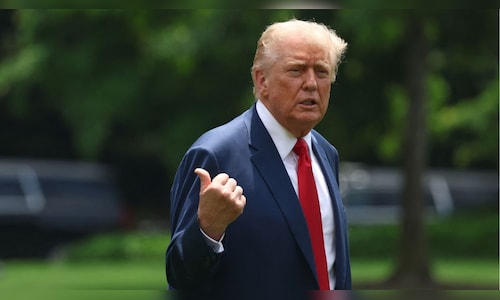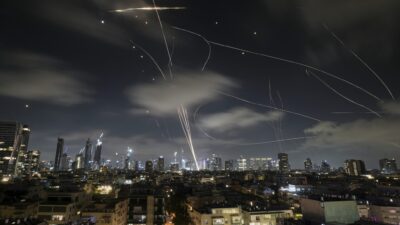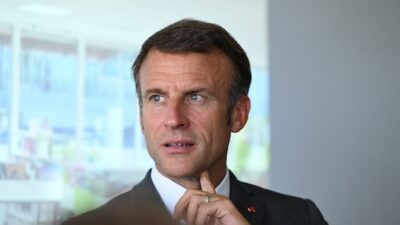“I’m giving them a period of time,” the US president informed reporters in New Jersey, following a meeting with his national security team earlier on Friday. “I would say two weeks would be the maximum.”
He dismissed European attempts to secure a diplomatic resolution after foreign ministers from the UK, France, and Germany conferred with their Iranian counterpart in Geneva on Friday.
Also read | Israel-Iran war Live updates: India plans to evacuate citizens of Nepal and Sri Lanka from conflict zones
After amplifying threats against Iran earlier in the week, Trump seemed to ease tensions on Thursday, suggesting he would wait two weeks to provide diplomacy a chance. Israel, which is committed to dismantling Iran’s missile and nuclear initiatives, has continued its strikes as Iran retaliated further.
While implying a potential reduction in the deadline for his ultimatum, Trump also indicated he “might” support a ceasefire during ongoing discussions. Iran has insisted that hostilities cease before entering negotiations, which Israel has rejected.
“I might, depending on the circumstances,” the president replied when asked if he would endorse a cessation of violence to facilitate negotiations. However, he expressed doubt about the feasibility of such a truce. “Israel’s doing well in terms of combat, and it appears Iran is struggling. It can be difficult to persuade someone to stop.”
European diplomats reported little apparent progress during their meeting, urging Iran to engage in discussions.
“We are eager to continue current discussions and negotiations with Iran and we urge Iran to maintain their dialogue with the US,” said UK Foreign Secretary David Lammy to reporters after his meeting with Iranian Foreign Minister Abbas Araghchi. “This is a critical moment, and it’s imperative that we avoid further regional escalation of this conflict.”
Araghchi indicated that Iran is open to another meeting with the European nations soon, as reported by the state-run IRNA news agency. He cautioned, however, that no progress could be anticipated without a halt to hostilities. “As long as the attacks continue, we will not negotiate with any party,” he asserted.
No follow-up meeting has been scheduled, and there’s been no consensus on the format or location of future talks, according to a European official.
Prior to the suspension of a two-month negotiation process with the US following Israel’s strike, Tehran had indicated a willingness to accept certain limits on its enrichment activities. Both Israel and the US maintain that Iran should not be permitted to enrich uranium at all.
Trump downplayed the European diplomatic efforts. “Iran doesn’t want to talk to Europe. They want to talk to us,” he stated. “Europe is not going to be able to assist them.”
Trump also noted that Israel lacks the capability to obliterate all of Iran’s nuclear facilities independently.
Most experts contend that a successful operation against the underground nuclear enrichment site at Fordow would necessitate American involvement since Israel lacks the most potent bunker-buster munitions capable of reaching such depths. However, some debate exists over whether Israel possesses the required tools.
“They really have a very limited capacity,” Trump remarked. “They could penetrate a small area, but they can’t reach very deep. They don’t have that capability.” He added, “Maybe it won’t even be necessary.”
Trump reiterated his belief that Iran was only weeks away from developing a nuclear weapon at the time of Israel’s strike, continuing to dismiss US intelligence assessments indicating that Iran’s leadership was not actively pursuing that goal.
Oil prices dipped on Friday following a Reuters report that Iran is willing to discuss limits on uranium enrichment, although they remain significantly elevated compared to pre-conflict levels.
Israel executed a surprise attack on Iran last week, asserting that the risk of its adversary acquiring nuclear armaments had to be neutralized. Iran retaliated with waves of missiles and drones, resulting in heavy casualties on both sides.
Trump has openly contemplated the US’s possible involvement in the conflict for several days, but appeared to recalibrate his stance on Thursday after a series of tough statements, including calls for Tehran residents to evacuate and threats against Iran’s Supreme Leader Ayatollah Ali Khamenei.
Israel’s military reported fresh strikes on Friday targeting numerous sites, including missile production facilities and the Tehran headquarters of the nation’s internal security unit, as well as the research and development wing of its nuclear weapons program. General Staff Chief Eyal Zamir indicated that his forces are ready for a “prolonged campaign.”
Israel’s fire services reported that missiles targeted the Tel Aviv area and southern regions of the country on Friday, resulting in serious injuries to three individuals.
Iran’s foreign ministry announced on X that an Israeli strike on a Red Crescent ambulance in Tehran resulted in the deaths of three medical personnel on Friday. Reports indicate that four medical facilities in Iran, including a children’s hospital, have been struck by Israel, as per the semi-official Mehr News agency. Earlier in the week, Israel stated that Iran had attacked a hospital in its southern region.
Meanwhile, banks, cinemas, and cultural centers in Tehran are set to gradually reopen from Saturday, according to officials — a tentative effort to restore normalcy. However, a prolonged internet and phone blackout appears to persist, leaving many citizens cut off from international platforms and websites.



